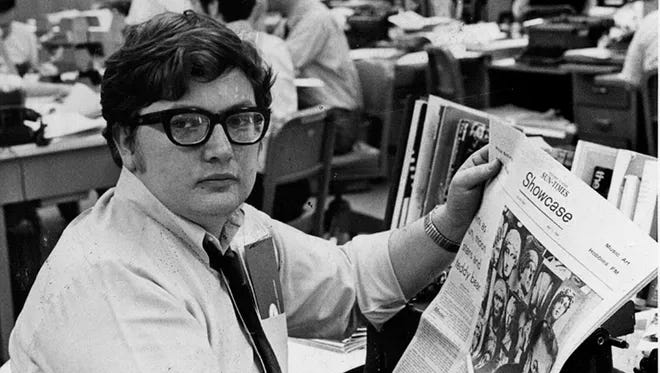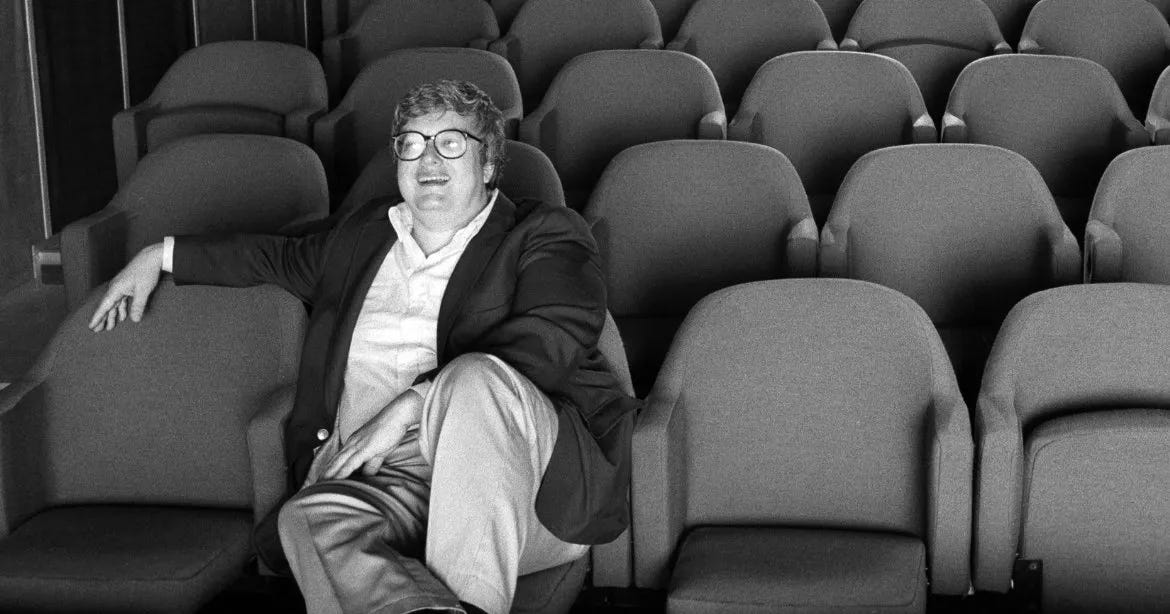He’s been an idol of mine since high school. Beyond commonly being a journalist and lover of movies, I see so much of myself in him when it comes to ambition and unlimited interest in learning about others. His rejection of a concrete way of doing things — specifically, what movies “should” be — his willingness to progress in many senses of the word, and his desire to spread the good word of global cinema to a mainstream audience is really what makes me (and many others) seek out his point of view so consistently.
The best film “critics” in my mind — or any sort of critic, for that matter — is more of an amateur sociologist than someone hellbent on assigning a rating. Self-describing himself as having an ego, ultimately, it’s obvious that Ebert has a genuine, humble appreciation for cinema — “cinema” meaning not just the medium of film but a portfolio of humankind’s emotional journeys. The film opens with this quote of his, which deserves to be included here in its entirety:
“We all are born with a certain package. We are who we are. Where we were born, who we were born as, how we were raised. We're kind of stuck inside that person and the purpose of civilization and growth, is to be able to reach out and empathize a little bit with other people. And for me, the movies are like a machine that generates empathy. It lets you understand a little bit more about different hopes, aspirations, dreams and fears. It helps us to identify with the people who are sharing this journey with us.”
Carefully directed by Steve James, his camera is clearly swelling with admiration but is far from a fanboy’s love letter. In the first twenty or so minutes, I admit that I found it difficult to look at the screen when modern footage of Ebert was shown. I began thinking if it was the right decision to include this more morbid phase of his life in what should be a celebration, but I quickly realized how Ebert’s push to continue working is such a testament to his enduring love of the movies and life (which, in his mind, are one and the same). And just as this came to me, Roger is shown writing that he wouldn’t want to be “associated” with the film if it didn’t “contain the full reality.” And he’s right. Good or bad, it’s a part of his narrative. (“It makes for a better story,” says James, behind the camera). Not only does it give us a full scope of Ebert’s story but it gives us a glimpse of how strong his wife, Chaz, is and how she’s changed his life. That word, “strong,” is so often overused, but if there ever was a true champion of compassion, it’s her.
I’ve rarely seen a documentary juggle the back-and-forth of a timeline this well and there’s a certain patience the film has that makes us feel like the story we’re being told is more than just a documentary of a famous film critic. “Hopeful” isn’t exactly the right word but the film communicates its theme of acceptance so very well. It tells truths that others might want to be swept under the rug but never uses it to dramatize the story in a manipulative way. James was clearly very conscious of how Ebert’s life should be told and his formula is appropriate for any other individual’s story. Life Itself recognizes that the stages of one’s life, mistakes and all, make up who someone is, and that there’s always room for positive change, no matter how long it may take to reach that point of improvement. From the often-seen-as-bitter relationship with fellow critic Gene Siskel being accurately portrayed as nothing more than brothers arguing (while intercutting hilarious At the Movies outtakes), to smaller, extremely endearing moments like showing Ebert’s car’s license plate simply reading “MOVIES,” Life Itself never gets lost in its mission to bring out the humanity and joy of this story.
Towards the end, the film displays a message sent from the director to Ebert, asking why his memoir (which the movie incorporates passages from), is titled Life Itself, to which Ebert doesn’t have the strength to answer. Fortunately, intentionally or not, if there’s one thing this film achieved, it was an answer to that question.
8/3/24





What I admire about him is his willingness to put the emotional impact of a movie first. Technical and even narrative concerns came second to a judgement about sincerity and emotional integrity. In a time of great emphasis on technical prowess and narrative box-checking, this kind of emphasis is sorely needed.
There's also a great capacity for the necessary humility to respect (mostly) the intention of the filmmaker for what it is, not for what he'd prefer it to be. After sifting through tons of late Pauline Kael and her doctrinaire prescriptivism of what she thinks films should be and how films that don't fit that framework are just bad, this is also a welcome tendency.
My main problems with Ebert come only in certain films, with his very centrist liberal desire to always both-sides political issues, as if political neutrality were a virtue in itself.